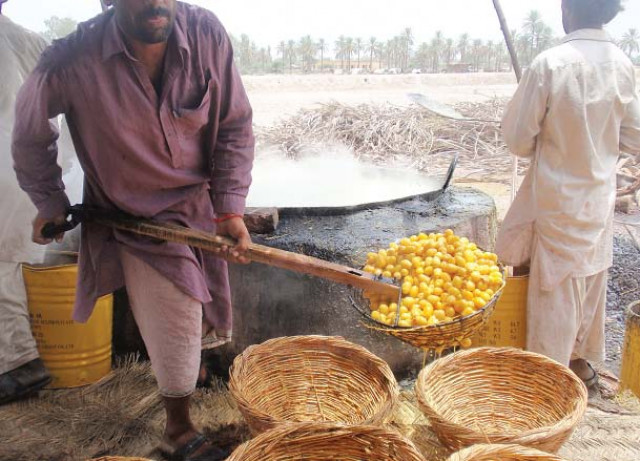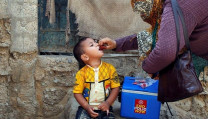Dyed, dried and supplied: how a date gets from a tree to your plate
Farmers claim that the government has turned a blind eye towards their needs.

While some may snack on a jar of Nutella and swear that there is nothing better to satisfy a sweet tooth, many people from rural Sindh, including Shikarpur, Jacobabad and Kashmore, would beg to differ. For them, nothing hits the spot like a good old fashioned date.
The fruit’s popularity can be gauged by the fact that many people bear the sweltering heat to make their way to the date market in Khairpur and stock up.
This means that there is plenty of business for date farmers. Families of nomadic labourers have camped by the road from Babarloi to Khairpur. Most men work on date farms while the women weave baskets and straw mats. “Date trees start bearing fruit around five to seven years after they have been planted and continue to do so for about a 100 years,” Farooq Memon, a date farmer in Khairpur, told The Express Tribune. He said that after the branches have been cut, dates are separated from them with the help of a comb-like wooden tool known as a ‘dandari’. Following this, the dates are graded by quality and the good ones are boiled in a mixture of water and yellow dye.
Farooq said that the end product of this process, dried dates, or ‘choharas’, have a yellowish colour. If the dye is omitted, the dates take on a brownish hue. After being boiled, the dates are spread over straw mats and left to dry under the sun for at least for six days. “In the past, people used to follow customs to stop the rain from impeding the drying process. These included tying the Holy Quran to a date tree or burying a donkey alive,” said Farooq. “But nobody does these things any more.”
When the dates are dry, they are filled in gunny bags and sent to the market.
A farmer, Haji Abdul Jaleel Memon, who owns 250 date trees, told The Express Tribune that the sex of a tree can be discerned by the quality of the fruit it produces. “A ‘female’ date tree will either never bear dates or produce very low quality fruit if sapling from a ‘male’ tree is not attached to it,” he said. About 60 per cent of the dates are picked before they are ripe and converted into choharas, while the rest are left on the tree to develop into fresh dates.
The most important role in date farming is played by the ‘charha’, or tree climber, said Memon. A charha scales date trees with the help of a rope. However, he has to be cautious while climbing, because a small mistake can make him plummet into a world of pain and even death, Memon said. According to him, a charha is paid Rs6,000 to cut dates from a 100 trees. He added that an experienced charha can procure dates from 15 to 20 trees in a day.
Jameel Ahmed, 32, has been climbing date trees for the last 17 years. “It took me a year to complete my training as a charha,” he told The Express Tribune.
The president of the Khairpur date market, Haji Mohammad Bashir Arain, told The Express Tribune that there are many varieties of dates produced in the district, including Aseel, Karbalai, Eiden Shah and Fasli, which are the best types. He said that 250,000 to 300,000 tonnes of dates are produced annually in Khairpur. “Around 80 per cent of dried dates are exported to India,” said Arain. “About 40 per cent of fresh dates are exported to different countries including the United States, United Kingdom, China, Canada, Germany and Japan. Every year we export dates worth seven billion rupees.”
Arain lamented the lack of government support for the fruit’s farmers and exporters. “Khairpur is the chief minister’s district, but he acts like a stepmother. The roads and sheds in the market have been constructed by the shopkeepers themselves,” said Arain. “Besides adding a huge amount to the national exchequer, the date farmers, processors and exporters are providing jobs to thousands of people. I don’t know why the government is ignoring us.”
Published in The Express Tribune, July 27th, 2012.


















COMMENTS
Comments are moderated and generally will be posted if they are on-topic and not abusive.
For more information, please see our Comments FAQ